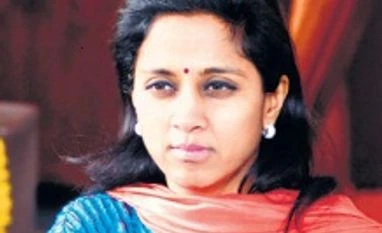"The continued success of Human Rights Council as the primary UN platform for promoting universal respect for the protection of human rights hinges on its ability to function in a non-selective, non-politicised and transparent manner," visiting MP Supriya Sule said here yesterday.
Speaking at a Third Committee session on Human Rights, she said the Council and its mechanisms should "avoid falling in the trap of selective country spotlighting and intrusive monitoring, which have been proved time and again to be counterproductive, and instead, focus on enhancing genuine dialogue and cooperation."
She said there is need also to find ways in support developing countries, particularly the Least Developed Countries, in implementation of their accepted recommendations through capacity building and technical assistance programmes.
She noted that India, as the world's largest democracy, with a proud history of unity in diversity and strong constitutional safeguards for fundamental freedoms, is "wedded" to the idea of just and equitable society.
Sule cited the Indian government's 'Sabka saath, sabka vikas' motto, saying respect for and promotion of all human rights for all is an integral component of the country's endeavor to achieve inclusive and sustainable development.
"We believe that a holistic and integrated approach that recognizes the inter-dependence, inter-relatedness and indivisibility of all human rights including the right to development should be at the centre of our collective efforts in promoting and protecting human rights.
"The 'transformation' that we desire to achieve by 2030 can become a reality only if we uphold the inalienable right of every person to development and create an equitable and just international order for its full realisation," she said.
You’ve hit your limit of {{free_limit}} free articles this month.
Subscribe now for unlimited access.
Already subscribed? Log in
Subscribe to read the full story →

Smart Quarterly
₹900
3 Months
₹300/Month
Smart Essential
₹2,700
1 Year
₹225/Month
Super Saver
₹3,900
2 Years
₹162/Month
Renews automatically, cancel anytime
Here’s what’s included in our digital subscription plans
Access to Exclusive Premium Stories Online
Over 30 behind the paywall stories daily, handpicked by our editors for subscribers


Complimentary Access to The New York Times
News, Games, Cooking, Audio, Wirecutter & The Athletic
Business Standard Epaper
Digital replica of our daily newspaper — with options to read, save, and share


Curated Newsletters
Insights on markets, finance, politics, tech, and more delivered to your inbox
Market Analysis & Investment Insights
In-depth market analysis & insights with access to The Smart Investor


Archives
Repository of articles and publications dating back to 1997
Ad-free Reading
Uninterrupted reading experience with no advertisements


Seamless Access Across All Devices
Access Business Standard across devices — mobile, tablet, or PC, via web or app



)
